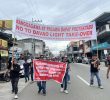DAVAO CITY – The National Council of Churches in the Philippines said low government expenditure had resulted to very low testing coverage for individuals who might be infected with human immunodeficiency virus.
Most Reverend Ephraim Fajutagana, chairperson of the NCCP and Obispo Maximo (Supreme Bishop) XII of the Iglesia Filipina Independiente said “with only less than 1% of the general population tested, and prevention coverage has fallen far below the national target of 80% established in 2005.”
“Globally, 37 million people live with HIV and need access to life-saving anti-retroviral medicines. The UNAIDS has issued the ‘90/90/90 treatment targets’ to end AIDS by 2030,” Fajutagana said, adding that the targets include “90% of people living with HIV should know their HIV-status, 90% of those who test positive should be on treatment, and 90% of those on treatment should have an undetectable viral load.”
“Thus to end AIDS by 2030, comprehensive and functional health systems which are able to get more people tested for HIV, put and maintain more people on anti-retroviral treatment, and give more people access to viral load machines to monitor treatment effectiveness are needed,” he said.
The Department of Health has recorded 22 cases of persons infected with HIV daily in October this year from one case a day in 2006.
Fajutagana, in a statement, said the Philippine government has “responded with a low investment in HIV and AIDS prevention, which has resulted in very low service coverage.”
“For 2016, the Philippine government pegged the budget for combating HIV and AIDS at P1.08 billion, almost double the amount allocated in 2015. Yet this is only 26% of the estimated P4.1 billion, which UNAIDS has estimated as the amount needed for effective HIV and AIDS prevention coverage,” he said.
In 2011, the NCCP approved the policy statement “Creating Nurturing Communities of Care with People Living with HIV and AIDS.”
“The NCCP HIV program has conducted education, networking, and provided direct services with People Living with HIV,” said NCCP Secretary General, Rev. Rex Reyes, Jr.
Reyes said they are calling for “the healing of the social ills that fuel the spread of HIV and AIDS.”
“These include poverty, unemployment, lack of access to quality and affordable social and health services, lack of political will and gender inequality, which all contribute to increase the vulnerability of people to HIV and AIDS,” he said.
The “ABC” approach which stands for Abstinence, Be faithful, Use Condoms along with “Awareness” and “Behavior Change” have been used as an all-inclusive messaging tools for HIV prevention programs of government in the country. These approaches have mostly been the frontline solutions offered by government and both local and international NGOs.
NCCP also criticized the government’s approach including the “ABC” (Abstinence, Be faithful and Use Condoms) along with “Awareness,” and “Behavior Change”.
It said the approaches “have been necessary but have proved to be inadequate as they have failed to take into account the other ways in which HIV can be transmitted and other drivers of the epidemic, including poverty, unemployment, poor healthcare systems, gender inequalities and the role of power in sexual relations.”
“Middle class and wealthy Filipinos respond to awareness campaigns because their participation in risky sexual behavior is voluntary. This is not the situation with the poor. For the poor, risky sexual behavior is generally compelled by structural and social factors beyond their control, for example prostitution and drug use, which are generated by poverty; and physical or sexual violence brought about by gender inequality,” said Fajutagana.
In Davao City, the Davao City Aids Council has recorded nine deaths out of the 1,295 cases of Human Immunodeficiency Virus (HIV) infections in Davao City since 1984 until July this year.
Read related story: 1,295 HIV-infections, 9 deaths recorded in Davao City
Non-government organization, Talikala who provides services to prostituted women and children have also confirmed that because of powerty, prostitution is rising which also involves minors who are “very prone to acquiring HIV-AIDS”.
“The spread of HIV and AIDS is not only a public health issue, but it is also a symptom of an unjust social order,” said Fajutagana.
The NCCP said they are calling on the government to ensure that the budget of the health department is based on the recommendation of the World Health Organization of 5% of the gross domestic product (GDP)
“We echo the call of UNAIDS that the national government must increase investments in the HIV and AIDS response and cover 50%-75% of national needs or $20-$30 million per year,” it said. (davaotoday.com)








